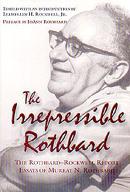Originally published in Inquiry, July 1982.
Leaders of the old right were among the most outspoken – and farsighted – critics of America's descent into the Cold War. Having just seen the United States emerge from the bloodiest global conflagration of all time, they were loathe to embark on further foreign adventures that might entail similar sacrifices of life, liberty, and property. Representative Howard Buffett, Republican of Nebraska, pointed out the domestic consequences of foreign policy in his cogent attack on President Truman's plan to aid Greece and Turkey, a plan many historians regard as a turning point in the Cold War.
"After we have spread ourselves in Greece and Turkey," Buffett told the House in March 1947, "and our leaders are patting themselves on the back for their successful firm stand, a new alarm will come in. Communistic outbreaks will be reported serious in another area. We will rush to that alarm. A billion-dollar call will come from Korea. There will be renewed demands from China."
"All over the world we would soon be answering alarms like an international fireman, maintaining garrisons, and pouring out our resources."
"In the meantime, what will have happened at home? Economy plans will have generally gone up in smoke… Attempts at economy would again be smeared as reactionary efforts to save dollars at the cost of the lives of American boys. Patriots who try to bring about economy would be branded as Stalin lovers."
"The misery of the people, from continued militarism and inflation, would soon become unbearable. As their anguished protests become vocal, the shackles of regimentation and coercion, so lately thrown off, could be refastened in the name of stopping communism at home."
 Buffett envisioned that a policy of globalism would bring in its wake "totalitarian tactics of smear, censorship, and lying propaganda" to "overwhelm those who resist," and demands for military conscription "to fill the ranks of garrisons for Palestine and the Near East oil fields."
Buffett envisioned that a policy of globalism would bring in its wake "totalitarian tactics of smear, censorship, and lying propaganda" to "overwhelm those who resist," and demands for military conscription "to fill the ranks of garrisons for Palestine and the Near East oil fields."
 "Even if it were desirable," Buffett concluded, "America is not strong enough to police the world by military force. If that attempt is made, the blessings of liberty will be replaced by coercion and tyranny at home. Our Christian ideals cannot be exported to other lands by dollars and guns. Persuasion and example are the methods taught by the Carpenter of Nazareth… We cannot practice might and force abroad and retain freedom at home. We cannot talk world cooperation and practice power politics."
"Even if it were desirable," Buffett concluded, "America is not strong enough to police the world by military force. If that attempt is made, the blessings of liberty will be replaced by coercion and tyranny at home. Our Christian ideals cannot be exported to other lands by dollars and guns. Persuasion and example are the methods taught by the Carpenter of Nazareth… We cannot practice might and force abroad and retain freedom at home. We cannot talk world cooperation and practice power politics."
Murray N. Rothbard (1926–1995) was the author of Man, Economy, and State, Conceived in Liberty, What Has Government Done to Our Money, For a New Liberty, The Case Against the Fed, and many other books and articles. He was also the editor – with Lew Rockwell – of The Rothbard-Rockwell Report.




